Lost Treasures
Paths of Glory (1957)
Directed by Stanley Kubrick/p>
In memory of the grand master Stanley Kubrick who recently passed away, and his new film, "Eyes Wide Shut", finally being released this spring, we here at "HO" decided to applaud one of our favorite Kubrick flicks. After his days as a photographer for LOOK magazine in the late 1940's, the young Kubrick (born 1928 in New York City) sold several documentaries and self-financed low-budget features. At a time when the studios ruled the Earth, here was a filmmaker who was truly independent.
His fresh voice caught the attention of Kirk Douglas who asked Kubrick, much to United Artists' dismay, to take the reigns of a movie based on the controversial novel by Humphrey Cobb called "Paths of Glory". The narrative revolves around a true story from World War I involving a suicidal attack on Fort Douamont. The bloodbath that ensued for the fort along the Front (a 500-mile long line of zig-zagging trenches that ran from the English Channel to the Swiss frontier) lasted six months and claimed the lives of over 315,000 French soldiers.
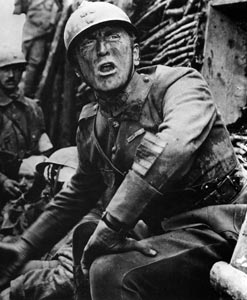
"Paths of Glory" (1957) is about one of Kubrick's favorite themes; the madness of war. The movie concerns the wide gap between those who take orders and those who give them, and is also an intelligent indictment of military practice as well as psychology. With a running time of 86 minutes, "Paths of Glory" is a true testament to good old-fashioned storytelling, short and to the cutting point.
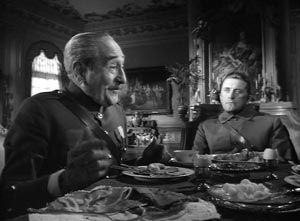
Kirk Douglas, in his best performance, plays Colonel Dax, a commander of the battle-decimated 701st Infantry Regiment of the French Army. It is 1916 and the French have been fighting the Germans for over two years along the Western Front with not much success. General Mireau (George Macready), the divisional general is ordered by the squirrelly General Broulard (Adolphe Menjou) to send the 701st Infantry on an all-out attack of an impregnable German position called Ant Hill within the next day. Mireau is persuaded to take the hopeless mission by Broulard only after being promised a rapid promotion. Dax explodes at the orders and informs Mireau that the charge will cause the death of most of his men.
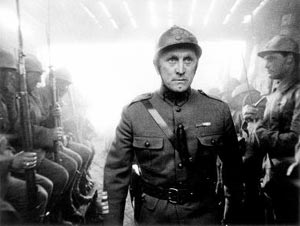
Being a soldier and knowing he must follow orders, Dax tells the men of the impossible assignment, and solemnly walks through the trenches in one of Kubrick's most famous tracking shots. At zero hour, Dax blows a whistle and the men "attack". Most never make it out of the trenches; none make it to the halfway point of no-man's-land. Observing from a post, Mireau notices that half the men are trapped in the trenches by German artillery and orders his own artillery to fire on the trenches! The battery commander refuses without written orders.
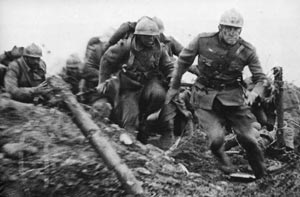
France banned "Paths of Glory" so Kubrick had to shoot the entire film in Germany, west of Munich. Hundreds of German policemen were hired as extras to play French troops. While six cameras tracked the attack in astounding black and white dolly shots in a scene that could rival the opening in Saving Private Ryan, the "actors" fell in their respective "dying zones" which were given to them on little maps. The German army is never seen, as if to imply the question of "who is the real enemy"?
In a wonderful analogous moment, Dax senses the men stuck in trenches and tries to persuade them to carry on the charge. When Dax attempts to climb out he is knocked back by the bodies of his dead soldiers as they roll into the trench. Needless to say, the attack is futile.
Mireau is outraged by his soldiers' performance and exclaims, "If they do not want to face German bullets then they will face French ones!" He orders the court-martial and execution of one hundred soldiers as an example. General Broulard balks at the idea and suggests three men, chosen by the divisional commanders. Colonel Dax offers himself to be court-martialed but Broulard laughs it off. "What, an officer? Never. How would that look?" Dax, previously complimented as a defense lawyer, requests to act as defense council at the court-martial.
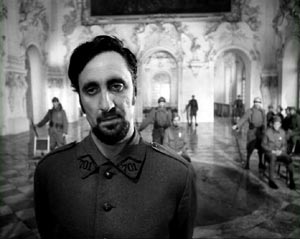
The trial is held in the clean, high-ceilinged ballroom of a chateau where the general is staying. With more aesthetic magic, Kubrick pits the soldiers in dark, dirty, confined spaces while the officers are always seen in sprawling, bright, clean, luxurious surroundings. At the trial, it is visually obvious that the soldiers are out of their element. Dax is incensed by the kangaroo court as the judges retire for deliberations. I can't go any further without giving away the whole thing but it is worth every second to rent this one tonight.
Every military man and leader of every country in the world should screen "Paths of Glory" to show the senseless waste of war. It was nominated for a British Academy Award in 1958 while being banned in France, even to this day. Winston Churchill expressed his admiration for the authenticity of the battle scenes while condemning the movie for its depiction of French officers. The use of music is sparse, if you notice it at all, the photography incredible, and there are great performances throughout. At the end of the movie, in a small pub, Dax listens to a German girl (Suzanne Christian) sing "Soldier Boy". Christian would later marry Kubrick. "Paths of Glory" is timeless, one of the great motion pictures in the annals of film history, and a damn good story.
Guido Sanchez -- copyright 1999